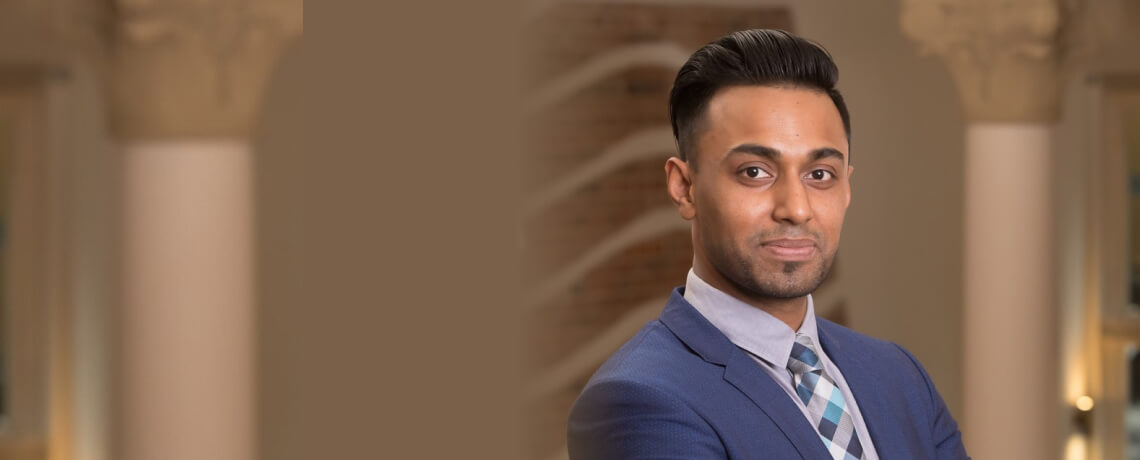
- Author: Richard McBride | CFO Magazine A/NZ Editor
- Posted: June 3, 2020
Seize the Day
Santonu Ahmed is not not afraid of taking a calculated risk or challenge! In April 2020, whilst most of the world went into lockdown, Santo was presented with an opportunity. In the middle of a global pandemic, Santo leapt into a new role as Group Financial Controller with one of Australia / New Zealand’s premier non-bank lenders, Resimac. That combined with raising a young family whilst ‘WFH’, Santo is also currently undertaking an Executive MBA program and in his ‘spare time’ likes to work out and keep healthy.
CFO Magazine A/NZ Editor, Richard McBride managed to secure a rare 5 minutes with Santo to understand what drives this ambitious finance leader.
RM: Santo, thank you for your time today – Most CFOs have bunkered down and holding tight to see what the future holds – What led you to Resimac and can you share a little background on the role and how you tackled a new job whilst working from home?
SA: The opportunity to join Resimac was a matter of right place at the right time albeit during an unprecedented pandemic. My career has predominantly been in banking and finance and a stint as CFO at a fintech provided me the end to end ownership of the financials. The prospect of joining Resimac was the perfect opportunity to fuse my banking product knowledge whilst looking holistically at management & financial accounting, statutory reporting and compliance.
What really sold me the role was my interaction with the CFO and the CEO throughout the interview process, what their vision for the organisation’s growth strategy through innovation was and genuinely focusing on customer needs. It is rare that in your career that you would come across authentic leaders who do and act as they say, and most importantly drive you to succeed. The key to success in this role like any other role would be the social contract with my CFO. As first steps, we have mapped out what success and key deliverables look like for the next 3 months, given this clarity it is a matter of execution of tasks that sit within those key objectives and then prioritising accordingly.
Whilst I am in my early days, I am enjoying every aspect of it and having a solid and experienced team has certainly made the transition easier. Working from home has its limitations in relationship building with business stakeholders, but you adapt and pick up the phone or jump on a video call and so far the support from the senior leaders from across the business has been terrific. Being out of sight also has its advantages and it has allowed me to focus on core aspects of the role and establishing an operating rhythm for my team. My previous experience in managing an offshore team has made “wfh” feel seamless, with video calls and short notice team huddles working well.
When I reflect on my career, the turning points were not when I got that big pay increase nor that promotion, it was always when I had incredible people around me which created the climate for success.
RM: Resimac is listed on the Australian Securities Exchange (ASX) – How are you adjusting to working in a listed environment compared to your previous role? Any learning curves?
SA: There were a number of challenges each time I had taken on a new role such as learning new products or understanding global accounting standards and local regulations and each time you find ways to overcome or mitigate those challenges. In this instance my learning curve was perhaps on the statutory reporting front for which I have been transparent with my CFO. Again, we go back to the social contract aspect, and we agreed to mitigate this by my CFO being actively involved in the upcoming FY20 year-end process. At the same time, I am upskilling myself using ASX resources and considering short online course to brush up on accounting standards.
Understanding different tax implications across multiple entity structures is also a challenge. At the same time this is what makes the job exciting, that nervousness, that bit of anxiety is what pushes individuals to reach peak performance. In the present climate you cannot be afraid to take on new challenges as this will prepare you for when the unexpected happens.
RM: Finance leaders are playing a crucial role in Covid19 – Just like knowing a good doctor when you are sick, everyone is now looking for a good accountant! What can CFOs and finance teams bring to the table in this current crisis?
SA: There is an old saying that every generation will face one monumental crisis. Unfortunately, the finance professionals in our generation have witnessed the GFC, Financial Services Royal Commission, COVID and perhaps not seen the last of it. In my career, I have seen people being walked from their jobs during the GFC and bank branches closing, and fast forward to the recovery years doing a business plan to reopen those closed branches and hiring new headcount. When you experience events of this magnitude, no doubt you become resilient and develop an inner voice that tells you that there is light at the end of the tunnel. As leaders we have the responsibility to project a level of calmness and stability and empower the Finance teams to play a key role throughout any crisis.
What COVID has shown us is that many businesses had not prepared for stress tested scenarios and had inadequate working capital for a rainy day. Going forward it will be increasingly important for business planning and viability, so businesses are agile and hold sufficient capital as shock absorbers. CFOs need to have standing levers of opportunities and risk scenarios in front of the CEO and senior management to execute anytime. For instance, Resimac’s core business is in residential Home Loans, a key insight from the finance team could be on how to assist customers impacted by hardship and offsetting the revenue loss with smart cost saving initiatives. This places focus on safeguarding customer and employee interests without compromising shareholder interests. Alternatively, in a context of a smaller company, the Finance team’s role could be to quantify and obtain the government grants that are applicable during COVID, renegotiating with suppliers including landlords on key expense deferrals, which could ultimately avert the decisions such as standing down employees.
With my experience in international markets, one observation is that Singapore boasts one of the world’s best institutional frameworks and world-class infrastructure and has strong focus on education and innovation. Dare I say, Singapore’s solid fundamental may mean Singapore will come out stronger out of COVID than their peers. There are certainly learnings from the economic management in Singapore that can be translated to business context here. Similar to the post GFC recovery, there needs to be smart investments in this period of downturn in order to come out with a competitive advantage. A good example is CBA’s investment in technology and digital channel post GFC which drove increase in market share in an incredibly competitive market without giving away margin in their retail offerings. The CFO and Finance team need to be able to influence the business to continue to invest in initiatives which reduces the time to deliver the end product to the customer and find innovative ways to reduce funding costs and overhead costs to remain competitive in the product offering.
RM: Alvin Toffler famously said “The illiterate of the 21st century will not be those who cannot read and write, but those who cannot learn, unlearn, and relearn” CFOs need to go beyond the numbers, the world and technology is changing at a rapid pace – What are you doing to futureproof yourself and how do you see the role of the CFO 10 years from now?
SA: The concept of unlearning and relearning is enormously powerful and can be underestimated. To put it in context it’s akin to telling a professional football player that they have been kicking the ball wrong all their life, and if they were able to relearn kicking the ball they would double their chances of scoring goals. Now translate that to a finance workforce context, imagine the challenge that would impose on the leaders to transform traditional bean-counting to fully automated processes and becoming exclusively advisors to the business. A lot of CFOs will tell you today that 80% of their team’s output are critical/value add and business insights, the sad truth is perhaps 20% is the value add aspect as teams still battle to evolve from manual tasks and basic processes. We are witnessing the fourth industrial revolution and it is inevitable that the manual processes of today will soon be long gone.
The qualities of a CFO or a finance leader that AI will not solve in our lifetime are Leadership, Influencing & Negotiating skills, and we need continue to develop on those areas. Evolution of Technology is not a threat, and CFOs need to embrace and invest on it adequately.
There is a saying that you can’t teach an old dog new tricks and the traditional CFO has been perceived as a daggy suit wearing bean-counter. Fortunately, a lot has changed and CFOs have a seat at the strategic table and increasingly critical in times of economic uncertainty. Coupled with their end to end view of the business and commercial understanding, the CFO could ultimately become the natural successor to the CEO and needs to be coached and developed accordingly by the organisation in line with their culture and values. CFOs cannot afford to be old dogs and must future proof themselves by taking a page out of the book of the Apex Predator who evolves and stays relevant as the environment changes.
RM: Finally, there are a lot of pressures facing finance leaders, how do you relax and switch off? What are your tips to perfecting the illusive ‘work / life balance’?
SA: As Finance leaders are under enormous pressures, personal well-being is perhaps the most important but an overlooked aspect. The key is to identify what is important to you, the “higher purpose”. For me personally, in the past I found it challenging to juggle a demanding role, education and being mentally “present” at home with my kids. Like many others my inability to switch off and channel away the stress meant I needed an outlet. For me, the outlet proved to be taking up a regular schedule to stay active on a daily basis whether it’s the gym, playing football or combat sports. When you play team sports, you stay sharp, you learn to lose and how to win against odds and you can translate that in a work environment when the pressure is on. Combat sports can be as simple as punching a boxing bag, thinking of all the time wasted in a meeting (which could have been covered in an email) is great motivation and a great stress relief!
Staying active allows me to manage my stress levels, switch off and connect with my kids. Being able to educate them on nutrition, living a healthy and active lifestyle also paves the way for their future wellbeing. There are no textbook answers on how to relax and switch off, what works for me may not work for others, but if you are clear on your purpose, the rest is up to you.
With COVID shutting down gyms and team sports, my wife and I have taken the opportunity to dust off our old gym equipment and currently on a DIY project to setup a mini home gym/studio – coming soon near you!








